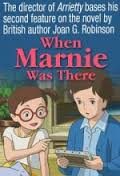
WHEN MARNIE WAS THERE
Japan, 2014, 103 minutes, Colour.
Directed by Hiromasa Yonebayashi.
Japanese animated films from Ghibli Studios have been popular since the 1980s, especially with the films of Hayao Miyazaki (the Oscar-winning Spirited Away, Ponyo by the Sea, The Wind Rises). They are generally available in the original Japanese language as well as in expertly dubbed versions, produced in the United States.
The present director, Hiromasa Yonebashi, previously made the interesting and entertaining Arrietty.
This is also a film about a young girl, Anna, who has been adopted. At school, she is something of a loner, not relating well to the other girls, keeping to herself with her sketching. She is 12. Her adoptive mother decides that it would be best to send Anna into the country during the summer holidays and she travels by train to a country town to be met by a genial, solid couple who give her room in their house which has a beautiful view of a lake.
When Anna goes to the post office to send a postcard, she notices a mansion across the water and detects a figure in the window. She is drawn into the house, investigates and finds a young girl there. When she is stranded by the rising tide, a kindly old man rows her back to her home. As the summer goes on, Anna returns to the mansion, becomes a great friend of the young girl there, Marnie.
Marnie is mysterious, and people comment that the mansion is haunted. Anna also makes a friend of a little girl in the town and they discover a diary with Marnie’s story.
Most of the film is about Anna and the friendship with Marnie, especially at the the large silo at the edge of the town, during a storm, with mysterious consequences.
The last part of the film seems rather hurried with a great deal of plot explanation, going back to tell the story of Marnie and her parents, her marriage and her daughter, the daughter’s rebellion against her mother and giving her own daughter to the orphanage. So, by the end of the film, the mystery is explained to Anna’s satisfaction and to our own.
The animation style is that of the Ghibli Studios, sketch and watercolour wash, all with a kind of naturalism – which suits the story which could have been told, almost with the same screenplay, in realistic life-action.
The Ghibli films have quite some attractive simplicity and humanity.
1. An entertaining film? Animation and its style? The target audiences? Children? Adults? Japanese? Worldwide?
2. The original British novel, the adaptation to Japan, the interpretation?
3. The style, the realism, the backgrounds, characters and expressions? A realistic treatment of the story?
4. The title, Anna, the meeting with Marnie? Her experiences, and Marnie’s background story?
5. Anna, alone at school, sketching, age, not relating well with the other girls, having to spend the summer, going to the family in the countryside, the adoptive mother and her calling her ‘auntie’?
6. The train ride, the Japanese countryside, the couple at the railway station, strong and steady characters, with Anna, in the house, her room, the beautiful view, the postcards, the prospect of the summer?
7. Going to the post, the shortcut, seeing the mansion, attracted, going through the water, the search, seeing the figure at the window? The water rising, stranded? The old man and his kindness in rowing her back?
8. The house, Marnie and her appearance, her age, the contrast with Anna, the talking, the bonding, sharing? The discussion about ghosts in the house? Marnie as a friendly ghost?
9. The little girl in the town, Anna and her bonding with her, the cleaning brigade and her brusque response, the later apology?
10. The mystery of the silo, Marnie and her friendship, the effect, going to the silo, the storm, fears, Marnie’s disappearance?
11. The little girl finding the diary, reading the diary, the story?
12. The visuals of the flashback, Marnie as a child, her parents being away, growing up lonely, the accident? Marnie and her, the marriage, the daughter, the
orphanage?
13. Marnie looking after her daughter, illness and death?
14. Anna, discovering she was, the daughter of Marnie’s daughter, life in the orphanage, her delight in finding out who she was?
15. Anna coming out of herself, calling her adoptive mother ‘mother’, the happy couple, the little girl and the friendship, her identity and Marnie, for a happy future?